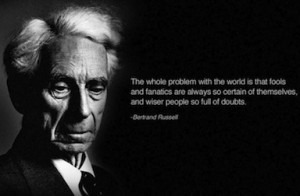 “The whole problem with the world is that fools and fanatics are always so certain of themselves, and wiser people so full of doubts.” — Bertrand Russell; 1872–1970
“The whole problem with the world is that fools and fanatics are always so certain of themselves, and wiser people so full of doubts.” — Bertrand Russell; 1872–1970
Epistemology is the study of what we humans know and how we know what we know. “Epistemological modesty” is just another way of saying “intellectual humility.”
Epistemological modesty is an ongoing awareness of:
a. how little we do know, and
b. how little we really can know.
Epistemological modesty is an attitude toward life, an understanding of how complex the world truly is and how frequently the law of untended consequences can be invoked.
It is willingness to say “I don’t know” and to accept that there are many things one may never know with complete certainty. The world is ever-evolving and changing, and in many respects a certain mind becomes a closed mind.
There are a couple of lines from Rudyard Kipling’s poem “If” that put it most succinctly:
“If you can trust yourself when all men doubt you, But make allowance for their doubting too”
Closing quotes:
“The fastest way out of a difficult situation is often the quickest way back in.” — Principle of Systems Analysis
“The world is too complex for us to know, and therefore policies should be designed that take account of our ignorance.” — David Brooks; 1961–, New York Times columnist and author
“Education’s purpose is to replace an empty mind with an open one. — Malcolm S. Forbes; 1919–1990, publisher of Forbes magazine founded by his father and today published by his son Steve (Malcolm Stevenson Forbes, Jr.)
“A conclusion is the place where you get tired of thinking.” — Unknown


0 Comments